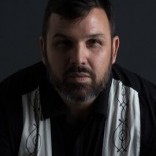Notes to THE WORLD
Tara Lynn Masih
It was the hunter’s first season in the Siberian Taiga. And the hunted knew it. Grigori Vitayev’s scent warned some off, intrigued others, so that he was always either just behind the musk deer, their white tails escaping into the pine and spruce cover, or last to the sable traps, his catch reduced to brown shreds of what would have been expensive tufted fur, now trampled into the icy-hard grains of bloodied snow. Wolf traces, a silent message he was not the only hunter in the subarctic forest.
Grigori was cold, not properly prepared for deep freezes, high drifts, and temperatures many degrees below zero. In desperation, he used his gloves to clean frozen white crystals off dry grasses and stuff the primitive insulation between his body and the wool lining of his sheepskin coat that was thick, but not thick enough.
The hunting co-op had provided some rations of potatoes, onions, and beef jerky, and he was able to kill some bush grouse with his Mosin rifle. On a day when the sun shone so fiercely it almost blinded him, he managed to shoot a squirrel out of a pine. This sent a light scatter of dry cones down to the ground. His mother shelling pine nuts from the Abazan market. With shaking blue fingers, he picked free a small handful of nuts that the squirrels and birds had not yet foraged. With the handle of his knife, he broke open shells to find kernels. They were frozen and almost tasteless, but he rolled them around in his mouth to thaw them and bit down with his teeth.
From then on, he looked to the trees as well as the bushes, the faint taste of late season nuts in his dry mouth. He had to ration the jerky and potatoes.
He was two weeks into his contracted four months’ work for the hunting supervisors—carefully guided by their water-stained cloth map—when he caught his first sable. By instinct and necessity, he had learned to cover the steel trap with moss and twigs. The rotting vegetation helped to mask his scent and the foreign shine of steel in a wooded plane. The co-op assumed you knew what you were doing if you were brave enough to apply for the job. But this was Grigori’s first season.
He discovered his first burrow near the Abakan River. Sables, he’d been told, favor the protection of tree roots. They den only temporarily in the cold season, in their constant move to find food and evade predators. Which made them hard to trap.
The screams of the animal were audible. A snow squall kicked up. Visibility was lessening. All was now white—the blue spruce, the red cedar, the red rowan, color being erased by the snow that clung to needles and bark and grass. He followed the otherworldly sounds of death throes, determined to get his first catch.
Entering the clearing, the only object not gray or white was two feet of writhing brown fur. Red blood drained from its trapped paw. The animal froze and bared its sharp teeth when it saw him coming. He raised his rifle. A clean shot through the dark eye. At least he now had one pelt he could sell, not devalued by bullet holes. The glossy sable was also the best color for trade. The fur winter thick. He felt his luck beginning to turn.
He dropped to his knees to skin the animal. With his hunting knife, he began at the mouth, just as he’d been taught by a neighbor in the village, to keep the legs and fur intact. Blood stained his gloves and pants. The only sound now was the soft muffle of falling flakes settling on snow and the scraping of his metallic blade. The woodpecker no longer hammered. The jays no longer screeched.
When Grigori stood, pelt now hanging from his rucksack, he could not see beyond a few feet. He began tracing his way back to the tent, following his own tracks, hunting himself. Till the tracks were lost.
Hands out in front to protect his face from branches that whipped it raw. Soon, a half foot of new snow had fallen and skittered and whorled across the taiga. Stopping, with no shelter, meant he would freeze. And light was fading. It came to him that he would never reach the tent. He had hiked to the farthest trap to find the first sable. Now, he had only managed to move a few hundred feet. With no idea in which direction he was facing.
But he would not die in a defeated heap.
He fought against the driving snow until near darkness. He fought, until the ground beneath gave way. Bitter cold water to his waist. Killing cold. He flailed his arms, feeling the sharpness of river ice and the stony floor of riverbed. The current threatened to knock him over, until he was plastered against a thick ice shelf. It steadied him. His body numb. Mother.
Almost ready to let go and give up. Then his glove knocked against a fallen tree. He felt about and found a branch strong enough to hold his weight. With one great heave, he left the deadly Abakan. This river he had been warned about. Named “bear’s blood.” It flowed to the Yenisi, treacherous and roaring under the ice shelf like its namesake.
He was free of it now but knew he had little time before it took his life in another way. Grigori tore off boots and pants. Took off his jacket, wrapped its arms around his lower half. His rucksack always had a spare pair of wool socks. He exchanged them for the wet ones, already freezing stiff.
He needed some sort of shelter fast. Standing to get his bearings, he could hear the river behind him. From having studied the cloth map, he knew that the mountain ranges reared up on the other side. If he walked or crawled away from the river, he might survive long enough to find shelter in the tree line.
~
When Grigori, the Hunter, told his story later on, to anyone who would listen, he would say that the cabin found him. Not that he found the cabin. It rose up as an obstacle he at first tried to crawl around. His foggy mind registered a darkness that needed to be passed. But then he noticed clean lines of snow, covering what had to be manmade.
He moved back toward it, using his arms to pull his dead legs and frozen feet. The ground flattened out. A structure loomed. He dug with his hands till he met a primitive door. He dug again, till it could swing out. He found the crack between the door and frame and pulled from the bottom, then dragged himself across the threshold. Into a dark, spiraling void.
~
When Grigori opened his eyes, he heard the soft sounds of snow melting off branches and landing on the roof. Chirps from nuthatches and the scattered scrapings of their clawed feet.
He glanced around. He was in a one-room shelter. If he stretched his arms out, they would reach both sides. It was half built into the hillside, so the shelter was part frozen dirt, part rough wood planks. One small window the size of a handkerchief in the wood portion let in a small square of light. Dust motes swirled in the air, along with ice crystals.
Rising on his arms, he took stock of the place that had saved him. A sleeping bench he had been too weak to climb on was beside him, just wide enough for one. A wood trunk with leather handles stood at the end. A dusty fur, looking like bear, lay on the floor. He pulled off his boots and socks and covered himself with it, sneezing from the puff of dirt that rose up. His feet were going from ice numb to a hot, tingling pain. He knew he had to wait it out, avoid walking on them. He was relieved to see they were red and a bit blistery, but not black.
The co-op had told him that hunting cabins were scattered around the taiga, meant to provide shelter for anyone who found them. But looking around, he was surprised to see evidence of a woman. This was not just some treehouse or lean-to cabin. It was a home. A small iron stove took up one corner to the right of the front door. A pile of spidery kindling beside it. On the wall opposite, next to the small window, a woman’s tattered cloak hung from a branch hook. Empty birch-bark containers lay everywhere.
There was no glass in the window. He needed to warm the cabin and himself. He thanked God that the inside of the rucksack had not gotten wet. From it, he pulled his flint to start a fire in the small stove. He dragged himself over and blew dust off the kindling so it would start better. Within minutes, he had a weak flame going. He fed it with fragile branches till it blazed, feeling his blood warm and move about his veins. He continued to feed the fire, now with birch-bark baskets he split with his knife. The sable pelt, by his side, under the bear skin, grew soft. He removed it and hung it to dry on the metal chimney, the face looking down at him with blank eyeholes.
“You bastard,” he said to it. “Why could you not be caught closer to my tent?”
He knew the fire would last only a short time, and he needed to plug up the window. He got to his knees and ripped the cloak down from the wall and stuffed it into the hole, smelling pine and smoke and something like . . . mint.
There was little else in the cabin. A few stubby paraffin candles, some flat rocks that looked as if they had been used as plates, a small table with one leg shorter than the others, some paper stuffed into cracks. A wooden spoon and some white fish bones were half-buried in the soft floor, which he now could see was made spongy by layers of old dried potato skins and rye grass. More fuel that he could burn.
His feet began to burn, but he knew not to rub them. Anguish. A flask in his rucksack, but Grigori did not want to tipple it yet. The frostbite would keep him from walking for a few days at least. He would wait until the pain and thirst became unbearable. Besides, he knew alcohol was not good for frostbite. It warmed the wrong part of you.
~
On the second day, after slow bites of jerky and a quick drink of vodka and a crawl outside to relieve himself, he thought to open the trunk. To his astonishment, inside were carefully organized pages of birch-bark notes. The inked handwriting was simple and in purple. Berries, he hazarded a guess. He felt as if he had found a gift.
He lit a candle stub and arranged the bark letters on the sleeping bench, starting with the bark numbered 1, and began to read them in order. Haltingly, as he had not attended school and was only familiar with what his mother had taught him to read—signs and notices and food labels and Bible passages. He knew it would take him days to decipher the writing, but all he had was time and the need to fill it.
1
My name is Desya Kuznetsov, and these are my NOTES TO THE WORLD. We have left you, THE WORLD, because everything that is sinful is within your money and your machines and your science. We cannot worship in the old ways any longer, so Mama and Papa escaped up the Abakan River. When the river was too ferocious, they carried their boat and supplies by poles over the tow path. They walked as far as they could go. They said they went into the mountains until they felt in their bones they were completely alone. Mama remembers the scent of bird cherry and the tangy waft of pine. We can cleanse our souls here, she said to Papa. He bowed in prayer. They prayed together in the bracken until it grew so dark they could only see by starlight. THIS IS WHAT I WAS TOLD.
2
I, Desya, was born in a pine trough, set amongst a privacy screen of bushes. The trough was filled to the brim with warm water by my nervous papa and brother. My brother, Fedor, had felled the tree and carved it out the day when Mama began to moan. The rye was just turning blue. Mama said she could smell the pitch in the bath water. It calmed her, until I came into our world. THIS IS WHAT I WAS TOLD.
3
If any person finds my NOTES, this is what I want that person to know. We are the OLD BELIEVERS. The terror began with the antichrist, the Tsar some called PETER THE GREAT. He caused mass suicides as the OLD BELIEVERS sought to save themselves from him. The Tsar kept food from their families, cut off their sacred beards and starved them. They were set on fire. Whole villages blew away as ash. It was then that some of our people ran to the forests. You see we cannot live with THE WORLD. It destroys us with its laws and rules and ungodly behavior. The wilderness is our salvation.
4
Our people ran to the Trans-Volga. We ran to Siberia. We ran North, into the wild. We ran from the lists the authorities were drawing up. The lists they were using to find us and hunt us down. Then we had to run again when the COMMUNISTS found us and began shooting.
Grigori put the four sections of bark aside. He was losing light in the cabin and didn’t want to burn another candle. He knew he was going to be snowbound for at least a week.
What had his mother told him about the Old Believers? They were almost legend in his village of Abaza. Everyone he knew expected them to have died off long ago in the taiga. When he had picked up his rucksack of supplies, there had been warnings of bears and wolves only. Not of the people who had split off from their fellow Christians, calling themselves the Old Believers, the True Christians, believing Tsar Peter the Great to be the Antichrist. They had been targeted, hunted as he hunted sable, and some had run to Siberia, then even farther into the protection of the dense and almost uninhabitable forests later in the 1930s when the Communist patrols began their war against Christians.
And here in his hands was proof that some had survived. He looked at the old dates. He could not tell what year she was using, but given the state of the ink, he did not think the early numbered notes could be much older than a decade from the present year of 1956. He looked around again at the cabin built out of forest and sealed with moss. He suspected that even in summer he would probably walk past it. It must blend into the land and be invisible to helicopters scanning for hunters to be picked up in spring, along with their precious pelts for the co-op. Sable caught in the wild brings higher prices.
He focused back on his feet. He needed to warm them. Some potato skins thrown into the woodstove, and the air around it was warm again. He put a stone plate inside to heat, then removed it with a blood-stained glove. Using more potato skins as a layer between his skin and the hot stone, he placed his feet on the surface. The blisters were swelling. Onion poultices cure everything, Grigori, remember this when I am gone. You must learn to care for yourself. His mother’s voice again. He had several onions in his rucksack. He’d split one, warm it, and put it on his bursting blisters after he napped. The stone’s warmth lulled him to sleep.
5
These are hungry times. Every day, we are hungry. We did not harvest enough potatoes. In April, we had birch juice, which we gathered in birch-bark containers. We kept the juice cold in the stream. We thought, this will be a good year. Then the June snow came. It began as a dark day. Then the banshee howling down the mountainside. Then a hard frost came after the powdery snow and killed many of the shoots and buds of the bilberry, huckleberry, and raspberry bushes. It killed the rye. The hunting pits yawned empty. Every day we had to make a choice to eat our crops or save them for seed. We dug for roots, cut grasses, chewed on bark, and ate the potato tops. The mice ate all the carrot seeds, so we had no carrots. The mushrooms did not ripen. This is when Mama and Fedor WENT AWAY. They left after trying to eat their leather shoes. The shoes gave them THE STRAIN. I laid my hand to their stomachs to try to heal, but they WENT AWAY nonetheless. Papa said they lived for as long as God wanted them to live. We put them under two 8-pointed crosses up the mountain. We pray they are saved. I walk around in snow barefoot, hoping to get THE STRAIN and follow them. But I just die inside of grief. It is only me and Papa now. Moving together through each season, made up of days divided by morning-noon-night. Noon is when the trees cast shadows. But there is a voice that haunts me. It says, you will be left alone someday in this wilderness. LEFT ALONE.
Grigori had slept through the darkness and awakened when the birds in the treetops started calling to each other. The tangy scent of onion now overpowered the faint scent of mint in the cabin. His blisters had burst. He wrapped his purple toes with a pair of socks, feeling the sting and knowing it meant life moving about in them. He found hidden in a box some pine nuts that he roasted and ate, close to rancid but still edible, with jerky and onion. A swig from the flask, and he was starting to feel human again.
He pondered the note. He was always alone now, even in his busy village. His mother’s health had failed last winter. She had GONE AWAY before the ice melted on the river that normally surged by his home. Her grave had taken two days to dig with eight men chopping through frozen earth. When he put her in the ground, he almost jumped in with her. It had always been the two of them, as his father had died young in the ore mine. Grigori had lived Desya’s fear.
His fear was with him each morning when he woke up in his village to the birds and white sun that fought to penetrate the northern mists. It settled on his chest so hard sometimes, he struggled to breathe. There had been a moment, when he had fallen into the icy river, when he wanted to go under and fill his lungs. But the moment passed. And here he was. Still alone, with only one pelt to his name.
6
Our enemy in the taiga is fire. We have learned to live with the deep snow, but we cannot control fire when it comes down from the inky sky and enters dry trees and bilberry bushes in dry summers. When it burns, we fight it all day and night. Lug many birch-bark containers filled with stream water, although the water is mostly wet mud after a day of this. We beat the fire, punish it when it does not obey us and die. We beat it with pine branches and throw dirt on it, our sooty hands grabbing at the dry earth to find some dust. Smoky air chokes. We become black with the soot and hair turns gray with ashes that fall like snow. So far, we have found a way to win.
Grigori’s feet were feeling less fiery. He no longer needed to warm them. Outside, gathering snow into cupped hands to pack on his feet, he squinted. The sun magnified the brightness of the snowbanks and drifts above his head. The slow melt continued in the trees, and the drips played melodies. He listened to the music of the taiga and was almost happy.
7
Luka brought me bread. I asked him, What is this bread? He asked me, You have never had bread? He looked to Papa. We are not allowed that, Papa said sternly. Luka looked sad and helpless, holding out the dark round loaf under the birch stand where we first met this mapmaker. Light from above sparkled across the dark globe he held out. So inviting. He stayed with us that night, the first person in the cabin who was not one of us. When they were snoring for a long time, I took a secret bite. I prayed as this food we were not allowed from THE WORLD grew soft under my teeth and tongue. Salty, bitter, fluffy. One bite was not enough. When Luka saw the half globe the next morning in his rucksack, he smiled at me, showing his one missing tooth. I felt my cheeks grow hot and ran to the corner where the icons hung to pray. I think this was our beginning.
8
He calls it LEMON, and this is how he spelled it for me L-E-M-O-N. It was bright yellow, warm, glowed like the sun in the sky. I cradled it in my cupped hands. Papa was no longer there to tell me if it was allowed. LOST. Was this allowed? It was not made by man. It smelled like berries. Luka used his knife to break it into two pieces. The centers are fleshy. He asked for a shell cup and water. He squeezed the LEMON. Juice dripped. I shuddered when I first tasted it, but then, I drank it all. I gave him a gift in return. I had gathered pine nuts before he returned by climbing the trees and shaking down the cones. Fedor used to say we were stealing them from the birds and squirrels. They are good for four years, I told Luka. I do not know why he laughed.
A lemon. He wished he had one now to look at, as if for the first time, like a child discovering a new world in his hands. He wanted to see a lemon as she did. Wonder about it. Feel its majesty.
He had not had one in years, but he remembered his mother grating the peel of one to put in apple cake. It came on a platter, upside down. Always look at the bottom of things, my son. Sometimes what is best is underneath.
9
Luka brought me to his cabin. He says we are married now after he does to me what I have seen the red deer stag do to his mate. He says I can grow my own hemp here to keep the fleas away. I imagined a patch of dark green growing by the door come spring. My husband leaves often to do his map work. Today, he left before the sun came up. I could not sleep. The cabin has what my husband calls an ELECTRIC TORCH. He said he does not need to use flint to light a lichina torch. A hard black button turns it on and off. When it is on, and then I turn it off, it leaves a splash of round blue light when I blink my eyes. I kept pressing it on—off, on—off. Light—no light. Papa—no Papa. This is not allowed, I could hear Papa whisper. I ran to a corner to pray. I tried to remember his face, wrinkled and warped and loving. Under his deer pelt hat. His gentle breath on my cheek in winter. LOST.
~
This was the last note read by Grigori before darkness intruded again. He was down to one candle stub. Most of the potato skins had become fuel for the stove. He had examined the co-op’s dirty cloth map and found the marked meeting point closest to the cabin—twenty plus kilometers, he guessed, to the south. They would not come for him for roughly three more months. He wished he had that electric torch now. He was not happy, he realized, to be reading about this other man. Luka. He wondered if Luka had made his ratty map.
Something didn’t sit right in his half-empty stomach. The girls in this village are not good enough for you, Grigori, you must go find someone further up the river. Maybe you will find a good Lithuanian girl in the town of Abakan.
But he would never leave his mother. She had already lost too much.
What was forming like a stormy cloud in his head? Why did he want to burn this delicate note?
He pondered what to do when something is lost. One can forget about it, push it out of one’s mind and heart and settle the panic of what is missing with willpower.
Or one can refuse to stop looking.
10
Luka hit me when I did not make the pine nut milk fast enough. My face hurt very much. No person had ever hit me before. I ran to the corner. I prayed rapidly. The other side of my face was hit this time from behind. Men from THE WORLD. Is this what they are like? On Luka’s little machine he calls a RADIO, we hear of people killing each other. Nothing has changed from the Old Days when we fled. Was God punishing me for letting an INTERMEDIARY into my life and into my bed? Was He punishing me for not remaining the bride of Christ? I have no Fedor anymore. I have no Papa, weak in body as he was, to protect me anymore. I walked to their gravesites yesterday. The crosses still stood, but the ground was overgrown with loosestrife. Still I listened for them—You have to do what we knew best, I heard. Run further into the wild.
11
He is hungry, the big bear that snuffles around my new cabin. He is big. It is spring. He is hungry. My food is high up on a platform I built to keep it away from animals. Last night, I heard the beast and smelled it through the cracks. Its moist black nose pushed through moss and shined up in the light from the birch lichina I left burning. I am less lonely in the light. I remember my brother, his voice. FEDOR. How he built a big hole and caught another bear. I sleep on its skin and it reminds me of family. But I am not strong enough to dig a hole larger than a grown bear. We have to live with each other, I am afraid. I threw some pine cones with seeds by the stream, so he would not eat me. I miss human voices. I am tired of listening to my own. I no longer speak, even to myself. There is no one to hear me. This abandoned hunting cabin I found, it has bad SPIRITS.
The snowbanks were now half what they were when he’d found the cabin. Grigori looked out the door. Drips, branches rubbing and creaking, pine needles whispering, woodpeckers knocking. Rays of sunlight bending through the dark branches like gauzy tunnels of scattered light. He peered into the dense forest, imagined her running once again. Where? Was she still out there? The ink on these last notes looked brighter than the rest. Fresher. He strained to listen, as if underneath the wilderness he could hear her bare footsteps in flight. Pounding the unyielding earth, taking her away from him. Luka. Him.
He felt a primitive anger. The need to strike and draw the red blood of a man. To put a choke hold around his thick grimy neck and have the power to end his breathing.
He read her final note.
His feet were now healed enough that he could put them into wool socks and his fur-lined boots. He winced, but bore the leather’s pressure. Taking down the stiffening pelt from the chimney, he packed it carefully into his rucksack. Grigori hadn’t spoken aloud to anyone or anything in weeks, except the sable. Testing his voice, he heard the dry rasp in it.
Grigori, life knows where it should take you. Listen. His mother let out her last long breath with effort, these last comprehensible words all she could leave him. It was enough.
12
It is time to leave this place. I cannot make the garden yield enough to live on. I am tired of digging paths to the stream in winter. I walked for days last month, south, following the stream until it flowed into a river. There is a warmer, sunnier valley at that meeting place. I rubbed the soil and found it was good. I should leave before the snow comes. I am packing my birch shoes, two dishes, two wooden spoons, two boxes, four birch containers. A hoe a knife an axe. A prayer book. An icon I took with me from Luka’s. Some seeds and nuts. I cannot carry the trunk. I will come back for it next year. I will come back for the bear fur. I will come back also for any potatoes still under the snow. If you read this before I come back, please come find me. Let me hear your voice.







